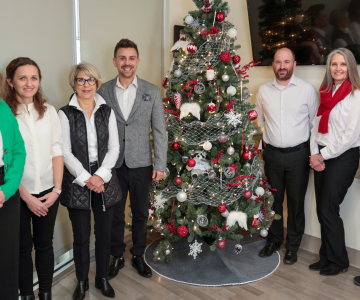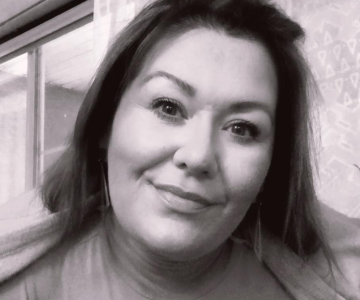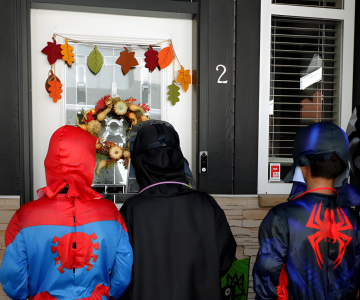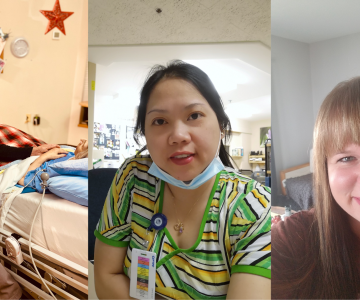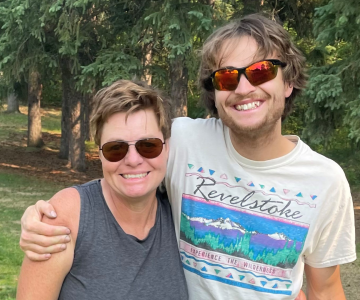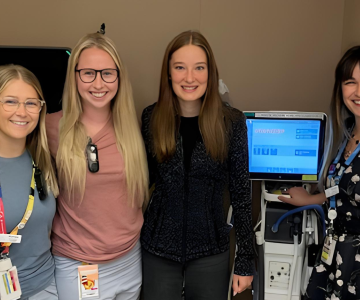Breadcrumb
Explore Stories
5 Minute Read
Community & Culture
Foundations in the Interior region raise funds that support medical equipment, care needs, and innovative local initiatives in their communities. Each organization includes respected community leaders, volunteers and staff who are passionate about meeting the needs of patients and families in Interior Health. Thanks to the generosity of their supporters, we all have a stronger health system.
In this next story of our series on the incredible health-care and hospital foundations throughout our region, we interviewed Ian Lindsay, chief executive officer of the South Okanagan Similkameen (SOS) Medical Foundation.
4 Minute Read
Community & Culture
Name: Emma Klassen (she/her/hers)Job Title: Recreation Activity WorkerYears of service: 1Worksite: Apple Valley & Hawthorn Park Adult Day ServicesCommunity: KelownaAncestral territory: syilx NationFavourite Quote /Advice to Live By: “Do better, be better.”
Emma is a daughter, sister, auntie, social worker, counsellor and recreational therapist, and a mother to five children.
Before joining Interior Health (IH), Emma worked as a counsellor for children and youth for six years with the Westbank First Nation. She loved her counselling career, and helped people and families with addiction, suicide and their day-to-day struggles. She also served as a bail supervisor for young offenders for several years.
When she was a counsellor, she and her team created a memorandum of understanding in partnership with the Ministry of Children and Family Development to create transparency in youth care.
3 Minute Read
Community & Culture
If you’re hit by a vehicle doing 30 km/hr, your chance of survival is approximately nine out of 10. At 50 km/hr? Your chances drop to about two out of 10.
In other words, the human body is no match for 2,500 kg of steel.
Road users like pedestrians, cyclists and riders on wheels (e.g., scooters and skateboards)—anyone who isn’t protected by a vehicle—are at the greatest risk of being injured. Safety experts call these people “vulnerable road users.”
3 Minute Read
Community & Culture
Moving to a new place often marks the beginning of an exciting chapter in one's life. For Ben Zygarlicki, relocating from Manitoba to the Interior Health (IH) region was more than just a change of scenery—it was a significant step towards building a life centered around personal and professional fulfillment.
Ben's decision to move to the Interior was primarily influenced by personal reasons, particularly to be closer to his partner who resides in the region. However, it wasn't just matters of the heart that drew him here; the allure of the region's natural beauty played a pivotal role.
"I have really enjoyed living in the region so far," Ben shares. "I love the mountain ranges and lakes. The people are also a pretty good bonus to the area. Everyone has been so welcoming and eager to help in my transition."
4 Minute Read
Community & Culture, Health & Wellness
Halloween can be an exciting time for children, but, with the distraction of candy and costumes, safety rules can easily be forgotten.
As we approach the Halloween season, the IH Healthy Schools team has put together some tips including tips from Food Allergy Canada to keep children safe and healthy during their trick-or-treating adventures.
2 Minute Read
Community & Culture
Name: Suzie Kinnunen (she/her/hers)Job Title: Respiratory Therapist/Respiratory Patient EducatorYears of Service: 3Worksite: Kelowna General HospitalCommunity: KelownaAncestral Territory: syilxFavourite Quote / Advice to live by: “It doesn't cost you anything to be kind.”
Suzie Kinnunen was born in Winnipeg and raised in West Kelowna, where she has lived most of her life. Suzie has been a respiratory therapist and respiratory patient educator with Interior Health (IH) at Kelowna General Hospital (KGH) for the past three years. Another fun fact about Suzie is that at the age of four, before moving to West Kelowna, she lived in India for two years.
4 Minute Read
Community & Culture
Health care assistants (HCAs) make a tremendous difference in our lives. HCAs may have many different job titles, including:
Community Health Worker
Residential Care Aide
Home Support Worker
Long-Term Care Aide
Home Health Aide
Continuing Care Assistant
Personal Care Aide
The one thing all HCAs have in common is that they provide frontline personal care and assistance services to vulnerable patients, clients and residents.
Meet three of our HCAs at Interior Health.
3 Minute Read
Community & Culture
Name: Deb Runge (she/her/hers)Job Title: Executive Director of Access and Flow, Patient Transport and Emergency ResponseYears of Service: 33 yearsWorksite: Kelowna Community Health & Services Centre Community: PentictonAncestral Territory: Syilx / OkanaganFavourite Quote / Advice to live by: ”Every day is a new beginning. Take a deep breath, smile and start again." – Maya Angelou
Born in Newmarket, ON and raised in 100 Mile House, Deb Runge has had a rewarding and diverse career at Interior Health (IH).
A registered nurse for 33 years, Deb chose a career in health care because of the variety of opportunities that the field presents.
-
Load More
Showing 18 of 676
STAY CONNECTED
Receive news and alert posts, and Stories@IH blog posts, right to your inbox!

